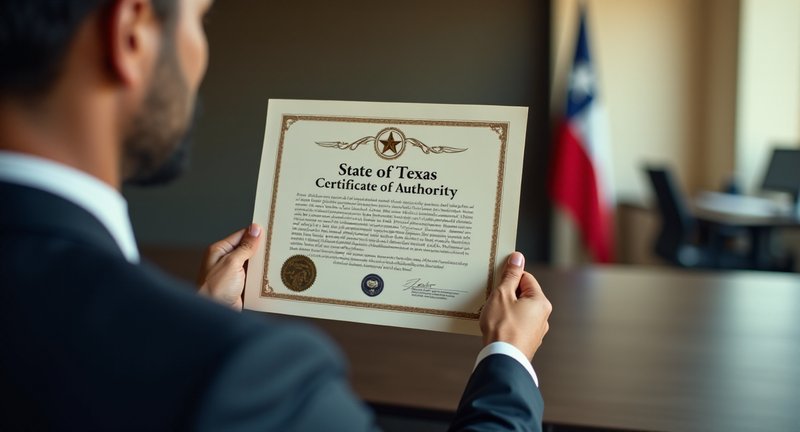State of Texas Certificate of Authority
Let me walk you through an often overlooked but critical document when operating a business in Texas the . If you’re like me, you probably didn’t give this much thought initially. But as soon as you start expanding your operations beyond state borders, it becomes a must-have. It’s your golden ticket, giving you the legal thumbs-up to conduct business in Texas if you’re based out of another state.
So, why is this certificate so important? Here’s the gist:
-
Legal Compliance: The certificate ensures that your business adheres to Texas laws. Without it, you’re essentially operating in the dark, which could lead to fines or penalties.
-
Tax Obligations: It allows you to register for state taxes, including sales and franchise taxes. The last thing you want is a tax issue down the road because you missed this step.
-
Business Credibility: Having a also adds a level of trust and credibility to your company. Imagine working with a vendor who isn’t registered doesn’t inspire confidence, right?
The application process for the certificate is relatively straightforward, but don’t rush through it. Gather your key documents, including your Certificate of Good Standing from your home state, and ensure your business name isn’t already taken in Texas. Once your application is approved, you’ll be able to officially operate under Texas law.

So, trust me take the time to secure your before diving into business here. It’s one of those foundational steps that’ll save you headaches down the road.
The Role of State of Texas Certificate of Authority
When you’re operating across state lines, particularly in Texas, things can get a little more complicated. I’ve seen businesses overlook a crucial step that can make or break their ability to legally operate. That one detail? It’s the key document that grants them permission to function in the state.
If you’re like me, when you first hear about this, it might sound like just another piece of paperwork. But don’t be fooled. Without this in place, your company could face fines or even be forced to halt operations. I’ve witnessed a few businesses scramble because they didn’t realize this early enough.
It’s not just about being compliant, though. This document serves as a stamp of legitimacy. It tells your clients, partners, and even competitors that you’re serious about doing business the right way. In my experience, the sooner you handle it, the smoother things will go.

For those unfamiliar with Texas regulations, it’s worth taking a closer look at the requirements. The process is straightforward, but it needs attention to detail. Trust me, it’s one of those things you don’t want to leave until the last minute.
From my perspective, the best approach is to get it sorted before you even think about expansion. Once it’s in place, you can focus on what really matters growing your business in one of the most dynamic markets in the country.
Introduction to Obtaining a Certificate of Authority in Texas
Getting your business set up in Texas when you’re coming from out of state can feel like stepping into a maze. One of the key steps you’ll need to tackle is obtaining the proper legal permission to operate, and trust me, it’s not as daunting as it seems. But don’t skip it this step is non-negotiable.
What we’re talking about here is a specific certification that allows your out-of-state company to do business in Texas. Whether you’re a seasoned entrepreneur or just expanding your reach, this document is crucial. Without it, your business is essentially operating in the shadows.
From personal experience, I can tell you that the process involves filling out a few forms and providing certain documentation about your company. The goal is to demonstrate to Texas authorities that you’re legitimate and ready to play by their rules. Sounds fair, right?
The tricky part is making sure you file the paperwork correctly and meet all deadlines. I’ve learned that Texas doesn’t mess around when it comes to these details. Any misstep, and you’re back at square one, dealing with delays.
By taking care of this, you’re not just crossing a legal ‘t’ you’re giving your business the green light to engage confidently in the Texas market. And that confidence, well, that’s priceless in the world of business.
Why a Texas Certificate of Authority is Essential for Your Business
If you’re thinking of expanding your business into Texas, let me give you a little heads-up: You’re going to need the right paperwork. I’ve seen too many businesses trip up by not getting one crucial piece of documentation without it, you’re walking a tightrope, and I wouldn’t recommend taking the risk.
The document I’m talking about is your pass to legally operate in the Lone Star State. It opens the door to doing business without a hitch. Here’s why it’s a game-changer:
-
Compliance with State Regulations: Without this authorization, your business could face penalties or be legally prohibited from operating in Texas. Trust me, you don’t want to get caught off guard by compliance issues.
-
Credibility with Clients and Partners: Having this certificate isn’t just a formality; it shows your clients, partners, and stakeholders that you’re serious about doing business the right way. It reassures them that you’re playing by the rules.
-
Access to Contracts and Opportunities: Many government contracts or bigger deals in Texas will ask for proof of your business being ‘official’ in the state. Don’t lose out on major deals just because of missing paperwork.
In short, this certificate is a small step but a big leap for your business. Skipping it isn’t an option if you’re serious about growing in Texas, make sure it’s on your checklist.
Key Benefits of Having a Texas Authority Certificate
You might be asking yourself, ‘Why do I need a Texas authority certificate anyway?’ I used to think the same until I saw the range of opportunities it opened for me. Trust me, it’s more than just a piece of paper – it’s your ticket to doing business on solid ground in the Lone Star State.
One of the top perks is that it makes your business legit in the eyes of Texas law. Without it, you could be navigating a world of legal headaches, especially if you’re expanding or operating from out-of-state. It’s like having a VIP pass for your business operations, cutting through red tape and keeping you compliant.
Here’s a quick rundown of the key benefits:
- Protection from legal risks: It helps you avoid fines, penalties, or the dreaded cease-and-desist letters. The last thing you want is to halt operations due to non-compliance.
- Tax and financial advantages: Once certified, you’re in a better position to take advantage of Texas’ business-friendly tax codes. It ensures you’re registered correctly to avoid unexpected tax surprises.
- Business credibility: Think of it like a stamp of approval. Whether you’re dealing with suppliers, clients, or investors, having this certification boosts your reputation. It shows you’re serious and operating above board.
- Access to contracts and partnerships: Many Texas companies and government agencies require businesses to be certified before entering into contracts. Without it, you’re likely missing out on big opportunities.
At the end of the day, securing this certificate isn’t just about jumping through hoops. It’s about putting your business on the path to growth, stability, and long-term success.
Understanding the Requirements for a Texas Business License
When I first started navigating the world of business in Texas, I quickly realized that getting a business license here is a bit more intricate than just filling out forms. The Lone Star State, with all its grandeur, has its own set of hoops to jump through, and understanding the requirements is crucial.
The type of license or permit you need largely depends on the kind of business you’re running. For instance, if you’re opening a restaurant, you’ll need health permits. On the other hand, professionals like accountants or engineers may require specific certifications. Each business type has its own maze of legalities.
Also, if you’re planning to operate across cities or counties, don’t be surprised if you’re met with additional local requirements. Texas doesn’t always make it easy, but it’s all part of the process. So, expect to navigate through county and municipal regulations, and yes, they will ask for more paperwork than you think.
Keep in mind that a business license in Texas isn’t just about checking a box. It’s about positioning your business properly for tax and compliance purposes. It sets you on the right legal footing, so you can avoid those nasty fines down the road. The key here? Get it right the first time, and you’ll save yourself from headaches later.
At the end of the day, the requirements for a Texas business license are like unlocking a door. Once you figure it out, the path to running your business in this great state becomes much smoother.
How to Apply for a Texas Business Operating Authority
With regard to launching your business in Texas, obtaining the green light to operate isn’t just a formality it’s your gateway to legitimacy. I’ve been down this road before, and it’s a process that starts with understanding the steps involved in gaining the proper permissions.
The first thing you’ll want to do is determine the exact structure of your business. Sole proprietorship? LLC? Each one will come with its own checklist of must-dos, and trust me, it’s critical to know where your business fits. I once missed a small detail here, and it slowed everything down.
Next up, gathering the required documentation. It might sound simple, but it can get tricky. You’ll need everything from your business name to your federal tax identification number (a bit of a puzzle sometimes), and don’t forget your legal registration. There’s no rushing this, especially when navigating the state’s system.
Once you’ve got your ducks in a row, the application itself comes into play. Texas makes it straightforward with their online system, but don’t let that fool you it still requires your attention to detail. I always double-check each form before submitting, because mistakes at this stage can cause frustrating delays.
After submitting your application, there’s a waiting period, and you’ll need a bit of patience. Texas processes thousands of these requests, so give yourself some breathing room. I’ve found it helps to keep checking your status online rather than waiting for an email to land.
Steps to Complete Your Texas Certificate of Authority Application
If you’re aiming to conduct business in Texas but are based outside of the state, you’ll need to navigate through the process of securing the State of Texas Certificate of Authority. Sounds like a bit of paperwork, but it’s manageable once you break it down. Here’s a guide from my own experience with helping companies get their foot in the door.
Step-by-Step Process for the Texas Certificate of Authority Application:
-
Verify Business Name Availability
First, you need to ensure your business name isn’t already taken in Texas. You can do this by searching through the Texas Secretary of State’s website. If your business name is available, great! If not, you’ll need to choose an alternative name to use within the state. -
Prepare the Required Documents
You’ll need certified copies of your formation documents from your home state. These documents should be dated within the last 90 days. Keep in mind, each state has its own procedures for obtaining these, so give yourself enough time for this step. -
Fill Out Form 304
This is the official application for the Texas business certificate of authority. The form will require details about your business such as your registered agent, office address, and business structure. It’s straightforward but make sure all your information is accurate. -
Appoint a Registered Agent in Texas
A registered agent is a person or entity responsible for receiving legal documents on behalf of your business. If you don’t have one, there are services available that provide registered agents in Texas. -
Pay the Filing Fee and Submit
As a matter of fact, you’ll submit the completed Form 304 along with the necessary documentation and a filing fee to the Texas Secretary of State. Once approved, you’ll be legally authorized to conduct business in Texas.
Remember, getting the Texas foreign entity registration is essential for staying compliant and avoiding fines. By following these steps, you’ll ensure a smooth entry into one of the largest markets in the U.S.
Document Preparation for a Texas Business Authority Certificate
Getting your documents ready for a business authority certificate in Texas can feel like a maze, but it’s easier when you know the steps. From my experience, it all starts with having the right paperwork in place, and trust me, that’s where most people trip up. Missing just one document could set you back weeks.
What’s key here? Precision. You’ll want to double-check every form whether it’s your articles of incorporation or your proof of good standing in another state. The smallest mistake, like an outdated address, could throw off the entire process.
And don’t overlook the timeline. Some documents need to be current, meaning you’ll likely need to renew a few. I’ve seen companies scramble because they didn’t realize their existing records were outdated. Being proactive about it saves time and stress.
One piece of advice: get familiar with the legal language. If something looks unfamiliar, don’t skip over it. It may seem tedious, but I promise, taking the time to understand what’s required will pay off. At the end of the day, this certificate isn’t just a formality it’s what allows your business to operate smoothly in Texas.
As a matter of fact, I can’t stress enough the importance of organization. Keep digital and physical copies of everything, in case you need to reference them down the road. Trust me, you’ll thank yourself later.
Common Mistakes to Avoid When Applying for a Texas License
When applying for a Texas license, it’s easy to stumble into some common traps that could slow you down. One mistake I’ve seen often is not paying attention to the fine print. It sounds simple, but missing one small detail can turn into a big delay, or worse, a denial.
Another thing people overlook is having their documents prepared and organized ahead of time. Texas loves its paperwork, and if you’re not ready to submit everything at once, you might as well be asking for a roadblock. Trust me, it’s not fun having to dig through files last minute!
It’s also tempting to think you can do everything yourself. Sure, I get it, you want to save a buck. But failing to get professional advice can cost you more in the long run, especially when it comes to legal nuances. In Texas, there’s always a curveball, and unless you’re an expert, it’s easy to get caught off guard.
And let’s not forget timing. Waiting until the last minute? Been there, done that, and regretted it. Don’t rush the process it only leads to mistakes that will push you further from your goal. Start early, take your time, and avoid unnecessary stress.
Also, underestimating the complexity of Texas-specific requirements is a rookie mistake. Just because you’ve applied in another state doesn’t mean you know how to navigate Texas’ unique system. Each state has its quirks, and Texas is no exception.
How Long Does It Take to Obtain a Texas Operating Authority?
How long does it take to get a Texas operating authority? Well, that depends on several factors, but I can share from my own experience that the timeline can range anywhere from a few weeks to a couple of months. It’s a process that’s not exactly swift, but it’s not as daunting as it might seem at first glance.
The paperwork is the big hurdle. Once you submit everything correctly, the waiting begins. And trust me, the waiting feels longer if you haven’t double-checked the forms. I’ve seen delays happen simply because of small mistakes in documentation. So, being meticulous upfront can save you time down the line.
It’s worth noting that the state has its own pace when it comes to reviewing applications. Bureaucracy isn’t known for its speed, but you can take steps to keep things moving. If you’re like me, you’ll want to follow up politely after a few weeks to ensure your application hasn’t been lost in the shuffle.
Of course, having all your business ducks in a row before applying is key. Insurance, compliance, and any additional requirements will need to be handled before you even think about submitting. It might sound tedious, but hey, better safe than sorry, right?
In my case, once everything was in order, I found the approval process took just under a month. So, patience is essential, but with a little diligence, you won’t be left waiting too long.
Fees and Costs Associated with a Texas Business License
When you’re thinking about starting a business in Texas, it’s easy to get lost in the excitement. But before you can truly get your venture off the ground, you’ll need to consider the fees associated with obtaining a business license. It’s not just about paying for a piece of paper this is the gateway to legally operating in the Lone Star State.
The costs can vary depending on the type of business you’re setting up. For a basic filing, you might be looking at something around $300, but it could increase if you’re dealing with more complex business structures, like a corporation or limited liability company (LLC). In some cases, additional fees for county permits or local business licenses might sneak their way onto your bill.
Once you’ve paid the initial costs, you’ll also need to budget for ongoing fees. Renewals aren’t always on the radar, but they’re essential for keeping your business in good standing. There are also additional costs if you need any specialized permits anything from environmental to health-related ones.

And then there’s the hidden side: professional fees. If you decide to use a business consultant, legal counsel, or accountant, those costs can pile up quickly. It’s worth it, though. These professionals can help ensure your business is set up correctly and avoid costly mistakes down the road.
It’s not all doom and gloom once those fees are settled, you’re free to focus on what really matters: growing your business. But a heads-up, keeping a bit of extra cash in your budget for unforeseen costs is always a good move. Trust me, it’s better to be prepared than scrambling later.
A Full Dissection of State of Texas Certificate of Authority
When stepping into business dealings in Texas, one of the critical milestones is obtaining the state’s official nod to operate. I remember the first time I went through this process it’s not as daunting as it seems, but it’s definitely a necessary hurdle.
You’ll find that getting approval involves making sure your paperwork aligns with Texas regulations. The journey begins with gathering details about your business, followed by filing the proper forms. There’s a bit of back-and-forth, and sometimes it feels like they ask for just one more document at every turn.
But don’t sweat it this process ensures that your business is operating above board in the eyes of Texas law. I’ve seen how smooth things run once you’re compliant. You can expand, make partnerships, and tackle new opportunities with confidence.
The best part? Once you’ve navigated the filing system, the doors open wider. There’s no longer the fear of penalties or shutdowns, and you get to enjoy the peace of mind that comes with being fully authorized.
And, if you ever find yourself lost in the process, don’t hesitate to ask questions or seek help from professionals who’ve been through it. Texas doesn’t make it impossible; they just want to ensure businesses are held accountable, and I think that’s a win-win.
What to Expect After Receiving Your Texas Authority Certificate
So, you’ve just received your Texas authority certificate congratulations! Now what? You’re probably wondering what happens next. From my experience, this is where things get a bit more interesting and where you start diving into real operations. Here’s a quick rundown of what to expect:
-
Operational Readiness: You’re now legally allowed to conduct business, but that doesn’t mean you can hit the ground running immediately. You’ll need to ensure that all the logistics, such as your insurance coverage and other compliance factors, are in place.
-
Navigating Tax Obligations: Once you’re recognized, expect to deal with the intricacies of state taxes. Texas can be particular, so it’s essential to stay ahead by keeping accurate records and understanding your obligations from the start.
-
DOT Compliance: If you’re in transportation or logistics, the Department of Transportation will now expect regular reports from you. This includes everything from safety inspections to keeping track of vehicle miles don’t slack here!
-
Growth Potential: With this certification in hand, opportunities for expansion within and beyond Texas can open up. You may want to explore partnerships or even engage in cross-state ventures. Trust me, the groundwork you lay now will pay off in bigger ways later.
Remember, while it might feel overwhelming, this is just the beginning of a bigger journey. Think of it as setting the foundation for a sturdy business that will thrive over time.
Renewing Your Texas Business Authority Certificate
Renewing your business authority in Texas might sound like a chore, but trust me, it’s easier than it seems when you know the ropes. If you’ve been operating for a while, you know that paperwork is just part of the deal. But keeping your business in good standing with the state is crucial. After all, you don’t want to run into legal or financial headaches down the road.
Here’s what I’ve learned: The process itself isn’t complicated, but it’s important to stay on top of deadlines. Miss them, and you might be looking at penalties or even the suspension of your rights to operate in Texas.
When it’s time to renew your authorization, keep these points in mind:
- Start early: Mark the renewal date in your calendar well in advance. Waiting until the last minute adds unnecessary stress.
- Review your business information: Make sure all your details are current. Has your business address changed? Do you need to update your list of directors or officers? Double-checking everything before submitting is always a good idea.
- Check for additional documents: Depending on your business structure or industry, you might need extra forms or certifications. It’s always worth taking the time to see if there’s something you’re missing.
- Fees and payments: Be prepared to pay a renewal fee. It varies depending on your entity type, but it’s important to budget for it ahead of time.
Bottom line: Renewing your business certification is part of maintaining a strong and legal operation in Texas. Stay proactive, and it’ll be one less thing to worry about in the long run.
Asked & Answered
What is a Texas certificate of authority?
A Texas Certificate of Authority is a legal document required by businesses incorporated outside of Texas to register and operate within the state. It allows foreign entities, such as corporations or LLCs, to conduct business legally in Texas. By obtaining this certificate, a company agrees to comply with the state’s regulations and taxation requirements while maintaining its status as a foreign entity.
How much does it cost to get a certificate of authority in Texas?
The cost to obtain a Texas Certificate of Authority varies depending on the type of business entity. For a foreign corporation, the filing fee with the Texas Secretary of State is generally around $750. However, additional fees may apply, such as expedited processing or legal assistance, which can further increase the cost. It’s advisable to consult the Texas Secretary of State’s website or legal counsel to get the most accurate and up-to-date fee information.
What is a certificate of authority?
A certificate of authority is a legal document that allows a business entity registered in one state (referred to as a foreign entity) to conduct business in another state. This certificate is typically required for corporations, LLCs, and other entities expanding operations beyond their home state. Obtaining a certificate of authority ensures that the business complies with the laws, taxation, and regulatory requirements of the state in which it wishes to operate.
Do I need a Texas certificate of fact?
A Texas Certificate of Fact is a document provided by the Texas Secretary of State that verifies the existence and legal standing of a business entity in Texas. Whether or not you need one depends on your specific circumstances. For instance, you might require a Certificate of Fact if you’re applying for business loans, entering contracts, or conducting due diligence to prove your company’s legal status and compliance in Texas.
What is the primary purpose of a certificate authority?
The primary purpose of a Certificate Authority (CA) is to verify the identity of entities (such as websites or businesses) in a digital transaction and issue digital certificates to them. These certificates ensure secure, encrypted communication by validating the entity’s credentials, thereby establishing trust between parties involved in digital interactions. CAs are critical for maintaining internet security, preventing fraud, and enabling secure data exchanges.
What is certificate authority example?
A well-known example of a Certificate Authority (CA) is Let’s Encrypt, a widely-used free CA that issues SSL/TLS certificates to websites to enable secure, encrypted communication. Other popular CAs include DigiCert, GlobalSign, and Comodo. These organizations issue certificates after verifying the legitimacy of the domain or organization, ensuring that users can trust the website they are interacting with.
Can I be my own certificate authority?
Yes, you can be your own Certificate Authority (CA), but it is typically only done for internal use within organizations or private networks. Being your own CA involves creating a private key and issuing certificates to internal users or devices. However, these certificates will not be automatically trusted by public browsers or operating systems unless manually added to trusted lists, making this option impractical for public-facing services.
How do I get a certificate from Certificate authority?
To get a certificate from a Certificate Authority (CA), you need to submit a Certificate Signing Request (CSR) to the CA. The CSR contains information about your organization and your public key. After verifying your identity and information, the CA issues a digital certificate, which can then be installed on your server to secure your communications. Many CAs offer step-by-step instructions for generating and submitting a CSR, as well as installing the certificate.
How much does an authority cost in Texas?
The cost of obtaining a Texas Certificate of Authority for foreign businesses depends on the type of business entity. For foreign corporations, the typical filing fee is around $750. Additional costs may include attorney fees, expedited service, and fees for document preparation services. For LLCs, the fee might differ, so it is essential to check with the Texas Secretary of State or a legal professional for accurate fee details.
What is a certificate authority in simple terms?
In simple terms, a Certificate Authority (CA) is an organization that issues digital certificates to verify the identity of a website, person, or organization. These certificates allow secure, encrypted communications over the internet, providing assurance that the entity on the other end is legitimate. CAs act as trusted third parties that help establish trust in digital transactions, ensuring data is transferred securely.
Is a certificate of authority the same as an EIN?
No, a Certificate of Authority and an EIN (Employer Identification Number) are not the same. A Certificate of Authority allows a business to operate in a state outside of its home state, while an EIN is a federal tax identification number issued by the IRS to businesses for tax purposes. The two documents serve different functions, though both are essential for legal and tax compliance.
Can anyone be a certificate authority?
Technically, anyone can create their own Certificate Authority (CA) for internal purposes, but operating a trusted CA for public use requires significant resources, infrastructure, and strict adherence to industry standards. Public CAs undergo rigorous accreditation processes and security audits to ensure they are trustworthy. Therefore, while it’s possible to be a CA in private environments, running a public CA is far more complex and regulated.











I absolutely agree with you! Getting the right legal permissions is like having a map in that maze you mentioned. I remember feeling lost at first, but once I tackled that paperwork, everything fell into place. It’s like a rite of passage for entrepreneurs looking to thrive in Texas. The attention to detail you pointed out is so crucial; I learned the hard way how a simple error can set you back significantly. Thanks for sharing your experience! It’s so reassuring to know I’m not alone in this journey. Keep up the great work!
Your insights on the complexities of operating in Texas are spot on! I remember when I first moved my business operations; it felt overwhelming to navigate the various requirements. But once I got that certification, it felt like a weight lifted off my shoulders. It’s amazing how something that seems like a minor detail can unlock so many doors. Having that stamp of legitimacy not only reassured my clients but also instilled confidence in my team. If only everyone could understand how vital this step is before expanding!
I completely resonate with your take on the importance of the certificate! When I first expanded my business, I underestimated how crucial it was to have everything in order before crossing state lines. Legal compliance really does serve as the backbone of your operations. It’s not just paperwork; it’s your ticket to credibility! Plus, knowing you’re covered from a tax perspective gives you peace of mind to focus on growth rather than potential pitfalls. Thanks for shedding light on this essential step!